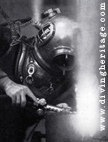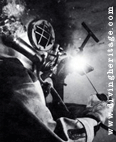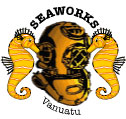SALVAGE:
In-Water INSPECTION:
- REASONS for Inspection
- Survey Inspection EQUIPMENT
- VESSEL In-Water Surveys
- Marine INFRASTRUCTURE Surveys
- MOORING Survey Inspection
- General Survey Inspections
- CORROSION Inspection
- Measuring Metal Thickness
- R.O.V. Inspection
In-Water CLEANING:
- WHY Cleaning? HOW to clean?
- HULL and RUDDER
- PROPELLER (cleaning/polishing)
- Marine INFRASTRUCTURE
- Sacrificial ANODES
- Water JETTING (high and low pressure)
In-Water REPAIRS, MAINTENANCE:
- Shipwork
- Cofferdam
- Marine INFRASTRUCTURE (overview)
- Single Point Mooring System (CALM & SALM)
- Wet WELDING & CUTTING
CIVIL WORKS & ENGINEERING:
- Dredging & Excavation off small BARGE
- Dredging, Jetting, Air-Lift, Dewatering by DIVERS
- Underwater DRILLING & BREAKING
- POST, PIPE, HOLLOW Section PILING with Portable hydraulic Hammer
- Maritime CONSTRUCTION
- Maritime DEMOLITION
- Marine OUTFALLS & Diffusers
- PIPELINES installation & maintenance
- Engineering
SEABED & EARTH ANCHORING:
- Cyclone Anchor Lines for rental

- MOORING Line: what's the (best) choice?
- HELICAL / SCREW Anchors information
- SCREW Anchors Mooring Systems
- PIPELING Anchoring
- Jetty & Walkway FOUNDATIONS screwing
- Expending Rock Anchors
- Grouted Rock Anchors
- Instant Foundation Anchors
- Earth Retention
![]()
![]()
Williams Form Engineering Corporation
- TOWAGE, Dive Support Vessel, Barges:
~ ~ ~ ~ ~ ~ ~ ~
Subsidiaries:
~ ~ ~ ~ ~ ~ ~ ~
Other useful Websites:
Diving
- ADAS Training Courses/job/careers
- New Zealand School of Commercial Diving Training
- Commercial Diving New Caledonia
Nautical Institutions
- IMCA International Marine Contractors Association
- BIMCO Baltic & International Maritime Council
- IMO International Maritime Organization
- Institute of Chartered Shipbrokers
- Institute of Marine Engineering Science and Technology
- International Federation of Shipmasters’ Associations
- International Ship Managers’ Association
- Maritime and Coastguard Agency
- Nautical Institute
- Lloyd’s List
Maritime Information

ABC Diving® Ltd
Port Vila, P.O. Box 3242 VANUATU South PacificComplete Diving Services to Vessels & Civil Engineering Industry
Please, contact us for:
SHIPS HULL AND MARITIME INFRASTRUCTURES
UNDER WATER CLEANING
WHY? HOW?
1. WHY Underwater Cleaning?
- To remove excessive MARINE GROWTH on maritime infrastructures or vessel for sale
- To prepare a surface for close VISUAL or CRITICAL INSPECTION (NDT)
- For fewer and shorter DRY DOCKINGS for vessels
- To prevent or limit the spread of INVASIVE non-indigenous SPECIES (NIS) via shipping
- For ship FUEL SAVING and SPEED INCREASE
- To UNBLOCK seawater INTAKES
- To keep an efficient CORROSION Prevention Systems (sacrificial anodes).
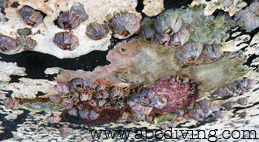
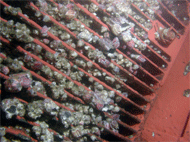
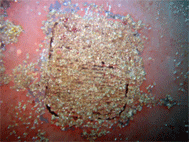
- The most effective way to save both money and the environment -
2. HOW to clean underwater?
ABC Diving offers complete cleaning in hours for Maritime Infrastructures and ship hulls, by using:
Hydraulic BRUSH CLEANING MACHINE
- PAINT SAFE: Equipment approved for Hull cleaning of SPC self polishing coatings, Silicone based coatings, Epoxy based coatings -
We operate a large line of Armada's UNDERWATER HULL CLEANING BRUSHES (meet & exceed Navy standards) http://www.armadahull.com/hullcleanersp.htm
Here is a sample of the brushes used for cleaning (http://www.armadahull.com/barnaclep.php):
![]()
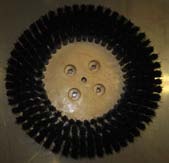
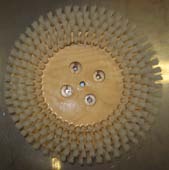
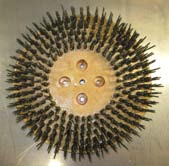
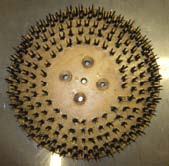
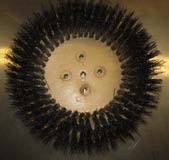
Different brushes and grits are available depending on the hull surface growth and condition
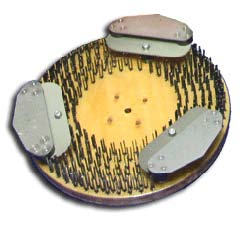
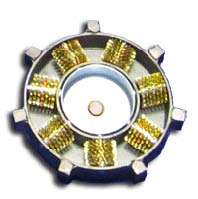
Both brushes above are for removal of barnacles and other encrusted sea growth from steel, concrete and wood pilings, seawalls, bridge supports, bulkheads and ships.
3. WATER BLASTING
Water blaster with specific lances and nozzles are very efficient above and below the water line.
PAINT SAFE, underwater blasting will clean efficiently by removing substances from PILLARS, WATERSIDES, SHIPS (hull, "niche" areas, props, anodes) and other underwater surfaces.
4. HIGH PRESSURE WATER JETTING
High Pressure Water Jetting provides the most effective underwater cleaning technique. The operation is commonly called "JETTING".
It removes coatings and rust, and runs with a single operator.
Removal of the marine growth alone is normally adequate for close visual inspection, then BRUSHES are efficient; but Critical NDT inspection, however, requires the removal from the metal surface of everything including paint, coatings, scale, etc. so as to leave a bright shiny metal surface, then JETTING is efficient
SAFETY: The high pressure water jetting gun is a potentially dangerous tool and needs handling with great care. All our divers using such equipment are trained in its use.
The following precautions should be observed by divers:
- At no time should there more tha one diver working in an area where jetting is taking place
- The signal to start the high pressure water supply should only be given by the diver when he is ready to start jetting
- Under no circumstances should the diver adjust the operating trigger in order to maintain an open position
- A strong guard should be fitted around the trigger to prevent inadvertent operation
- The diving supervisor should always be in direct contact with the technician running the pumps who should be standing by his pump whilst it is running. It is imperative that clear communications exist at all times between the supervisor, the pump and the diver.
°°°°°°°°°°°
You may be interested with:
